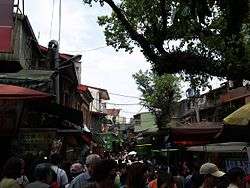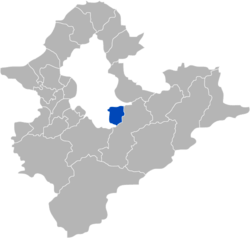Shenkeng District
| Shenkeng 深坑區 | |
|---|---|
| District | |
| Shenkeng District | |
 | |
| Nickname(s): The Tofu Capital | |
 Shenkeng District in New Taipei City | |
| Coordinates: 25°0′12″N 121°37′2″E / 25.00333°N 121.61722°ECoordinates: 25°0′12″N 121°37′2″E / 25.00333°N 121.61722°E | |
| Country | Republic of China (Taiwan) |
| Special municipality | New Taipei City |
| Villages (里) |
List
|
| • Mayor | (Kuomintang) |
| Area | |
| • Total | 20.58 km2 (7.95 sq mi) |
| Highest elevation | 562 m (1,844 ft) |
| Lowest elevation | 32 m (105 ft) |
| Population (January 2016) | |
| • Total | 23,614 |
| • Density | 1,100/km2 (3,000/sq mi) |
| • Households | 9,463 |
| Time zone | UTC+8 (CST) |
| Postal code | 222 |
| Area code(s) | 02 |
| Website |
www |
| Shenkeng | |||||||||||||
| Traditional Chinese | 深坑區 | ||||||||||||
|---|---|---|---|---|---|---|---|---|---|---|---|---|---|
| Literal meaning | deep pit; deep mine | ||||||||||||
| |||||||||||||
Shenkeng District (Chinese: 深坑區; pinyin: Shēnkēng Qū; Pe̍h-ōe-jī: Chhim-kheⁿ khu) is a rural district in central New Taipei City in northern Taiwan. Formerly an agricultural and mining town, it is now famous for its numerous tofu restaurants and vendors.
History
The area is first recorded as the preserve of a tribe of Pingpu aborigines during the Qing dynasty period in Taiwan. When Han Chinese farmers eventually moved in to develop the area, they bought the low-lying land from the aborigines and began cultivation in the main valley.[1] The modern name of the township, Shenkeng, literally means deep pit or deep mine, and indeed the area used to have several active coal mines.[2]
Geography
Shenkeng is a rural district which borders Taipei City's Wenshan District to the west, Nangang District to the north, and the Shiding District of New Taipei City to the east.
Politics
Politics in Shenkeng have largely been uneventful; the town is considered a safe seat for the Kuomintang. An exception was in 1996, when several members of the council were arrested on suspicion of connection with organised crime.[3]
Education
Shenkeng is home to Tungnan University, a private technical university.[4] There is also a Junior High School and an Elementary School in the town.
Tourist attractions
The economy of Shenkeng is centred on tourism, and that tourism is based largely on tofu. The district is sufficiently well known in culinary circles that it has been a subject of media interest in Japan and Hong Kong.[5] The tofu from Shenkeng has an unusual ratio of soybean to gypsum, giving it a yellowish colour and distinctive flavour.[5] The town has become so readily identified with tofu[6] that it has earned the epithet "The Tofu Capital".[7]
There are also extensive hiking trails, some of which were in use during the Japanese era by anti-Japanese guerilla fighters.[8]
Transportation
Transportation in Shenkeng is limited to roads only; there is as yet no railway or mass transit service, although proposals have been made to extend the Wenshan Line of the Taipei Metro into Shenkeng.[9] Three bus companies offer passenger services within Shenkeng and between Shenkeng and surrounding settlements.
See also
Notes
References
- Chiu, Shao-wen (2008-08-29). "Shenkeng calls for MRT extension" (in Chinese). Retrieved 2009-04-29.
- Chung, Oscar (2002-02-02). "Tofu Town". Taiwan Review. Retrieved 2009-04-29.
- Du Bois, Christine M.; Tan, Chee Beng; Mintz, Sydney Wilfred (2008). The World of Soy. University of Illinois Press. ISBN 978-0-252-03341-4.
- Feuchtwang, Stephan; Wang, Mingming. Grassroots Charisma: Four Local Leaders in China. Routledge. ISBN 978-0-415-24418-3.
- He, Chunshun; Lee, Chin-nan (1963). Economic Minerals of Taiwan. Geographical Survey of Taiwan.
- Janda, Petr (2008-06-12). "Shenkeng – the tofu capital". China Post. Retrieved 2009-04-29.
- "Local History" (in Chinese). Shenkeng Township Government. Retrieved 2009-04-29.
- "Tung-nan Institute of Technology Home Page" (in Chinese). Tung-nan Institute of Technology. Retrieved 2009-04-29.
- Woodworth, Max (2005-03-30). "Tea Time on the resistance trail". Taipei Times. Retrieved 2009-04-29.
| Wikimedia Commons has media related to Shenkeng District, New Taipei. |
